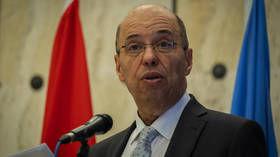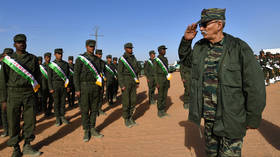One African state beats another in vote to lead UN body

Morocco was elected to lead the United Nations Human Rights Council (UNHRC) in a secret ballot in Geneva on Wednesday, following a showdown with South Africa, after the African continent failed to present a single candidate for the global institution's presidency.
Omar Zniber, the Moroccan permanent representative to the UN Office in Switzerland, obtained 30 votes from the 47 member states of the UNHRC, with the remaining 17 supporting South Africa's candidate, Ambassador Mxolisi Nkosi.
The UNHRC – an intergovernmental body defending human rights around the world – has 47 members, elected for three-year terms on a regional basis, with this year being Africa’s turn.
South Africa had criticized Morocco's human rights records prior to the vote. Pretoria’s representative claimed in an interview with Reuters that Rabat was the “antithesis of what the council stands for,” making it unfit to lead the body. The Arab nation also accused Pretoria and other African states of undermining its efforts to take on the role.
In a statement, Ambassador Zniber said it would be an “honor” for him and Morocco to hold the presidency for the Council’s 18th annual cycle.
He said he now had a responsibility to “meet the requirements” of the body's “common work,” which is “so important and so fundamental: the promotion of, respect toward and guarantee of human rights as universally recognized.”
The Moroccan Ministry of Foreign Affairs also applauded the win, describing it as a reflection of the “confidence and credibility inspired by Morocco's foreign action” despite “Algeria’s and South Africa’s efforts to counter it.”
The vote came at a time of deteriorating relations between Morocco and its North African neighbor Algeria, arising from Rabat's sovereignty claim over the Western Sahara, where the Algeria-backed Polisario Front seeks independence. Morocco has denied allegations of human rights violations against its opponents in the former Spanish colony, which it annexed in 1975.
Morocco has been engaging countries, including African neighbors, to gain support for its policies, which include limited autonomy offer for the phosphate-rich, sparsely populated region. Last year, Israel recognized Morocco's sovereignty over Western Sahara, following the US recognition in 2020.
However, it has failed to secure the support of countries such as Algeria and South Africa, which chaired an event in Geneva last month to promote self-determination for the indigenous Sahrawi people.
Rights organizations cited by Reuters have urged Morocco to use its new position to protect human rights.
“In particular, Morocco must refrain from intimidating or carrying out reprisals against human rights defenders engaging with the UN,” Tess McEvoy, co-director of the International Service for Human Rights advocacy group's New York office, said, according to the news outlet.













